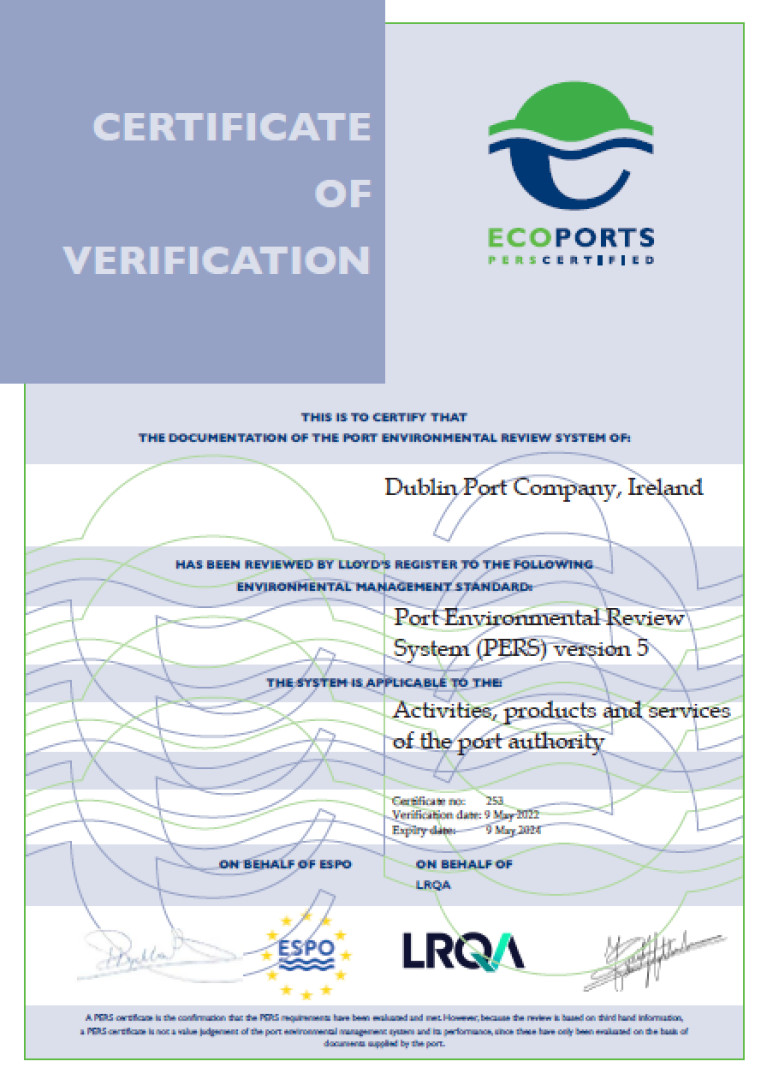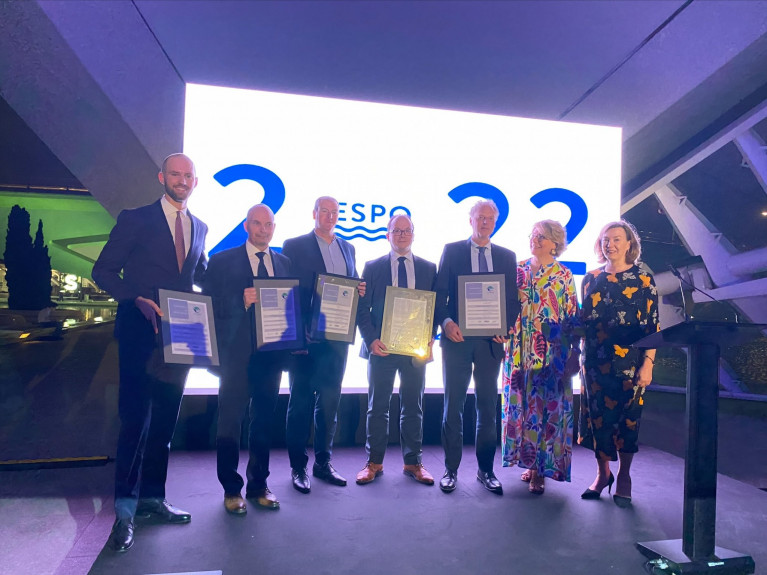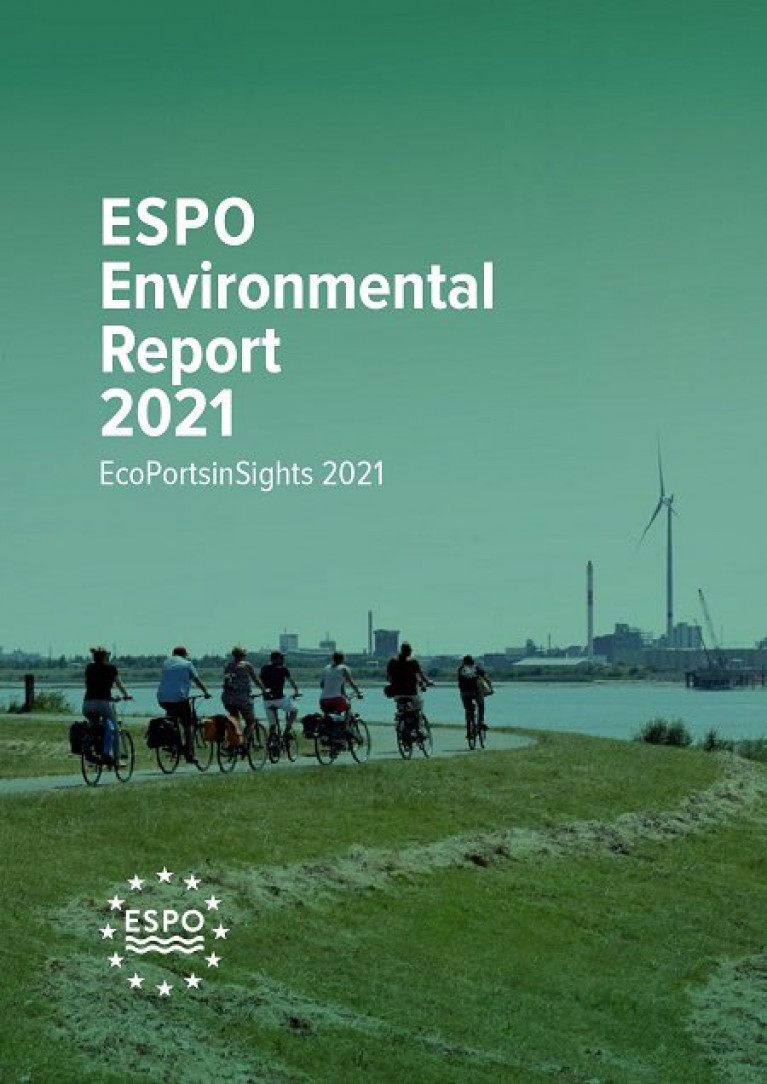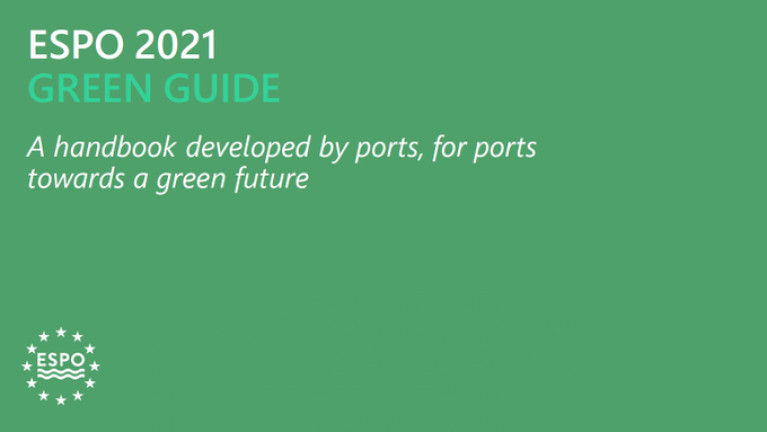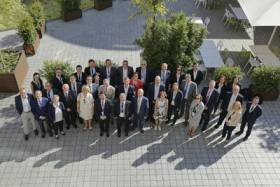Displaying items by tag: EcoPorts
Stronger than Ever as 'EcoPorts' Congratulated at European Sea Ports Organisation (ESPO) Conference
On the first day of the European Sea Ports Organisation (ESPO Conference held in Bremen, Germany today, the organisation congratulated the ports listed below for being certified through the EcoPorts’ environmental management standard (PERS).
Pers Ports: Grand Port Maritime de Dunkerque (France), Volos Port Authority (Greece), Port of Den Helder (the Netherlands), Autoridad Portuaria de Castellón (Spain), Autoridad Portuaria de Melilla (Spain), Santander Port Authority (Spain), Peterhead Port Authority (United Kingdom), Shoreham Port Authority (United Kingdom) and Asyaport Liman (Turkey).
Isabelle Ryckbost, ESPO Secretary General, Zeno D’Agostino, ESPO Chair, and Valter Selén, EcoPorts Coordinator, announced the PERS-certified ports during the annual ESPO Conference in Bremen.
Isabelle Ryckbost, ESPO Secretary General, commented: “It is great to see so many ports getting the PERS certification, either for the first time or getting a new certification. We know it takes an effort for ports to go through the process. We must not forget that considering the challenges ahead, the green agenda of ports is full. It is very rewarding to see that ports continue to do it and newcomers are joining.”
Valter Selén, ESPO Senior Policy Advisor and EcoPorts Coordinator, said: “The EcoPorts Network goes from strength to strength, with a growing number of ports joining the Network and becoming PERS-certified as part of their greening efforts. EcoPorts provides Europe’s ports with a means to demonstrate commitment to environmental management, and remains uniquely successful as a port-driven initiative on the European level. The recent PERS certification of 9 ports and the review of the SDM is testament to the continued relevance of the Network to ports in Europe.”
PERS (Port Environmental Review System) is the only port-specific environmental standard. The last five years have seen important increases in its recognition and membership, with 103 ports from 24 countries currently counting themselves as part of the EcoPorts Network, and 31 ports holding PERS certification. Compliance with the EcoPorts’ PERS standard is independently assessed by LRQA Nederland B.V. and the certificate has a validity of two years. EcoPorts’ PERS is revised after the 2-year period to make sure that the port continues to meet the requirements.
Reviewed Self-Diagnosis Method (SDM) further strengthens EcoPorts as the foremost environmental management tool for the port sector
The ESPO secretariat and the EcoPorts science coordinators have been reviewing the Self-Diagnosis Method (SDM). The SDM is a checklist that allows the port to identify and reflect on environmental risks, providing a snapshot of the environmental management efforts in the port. It includes all key indicators relevant to port environmental work, and a completed SDM is valid for a period of two years.
The SDM is usually reviewed every two to three years to account for new developments in port environmental management and sustainability. The exercise is intended to ensure the relevance and usefulness of the SDM as the entry point into the EcoPorts Network.
The updated SDM maintains the setup of the previous version, and remains in line with the international scope of EcoPorts. It strikes a careful balance between updating and renewing the SDM, and the ease of use of the SDM tool.
This latest review has seen the simplification, clarification and refinement of the SDM questionnaire. Key new indicators include whether the port has a roadmap for greening, whether the port monitors ambient and underwater noise, the possibility to allow battery charging and battery swapping in the port, agreements on the use of onshore power supply in ports, demand for alternative fuels, and the operational resilience of ports.
The reviewed SDM will ensure that the EcoPorts Network maintains its position as the foremost environmental management tool developed by ports, for ports.
For more information on EcoPorts’ PERS and SDM, click here.
The European Sea Ports Organisation congratulates the Port of Rotterdam for being recertified through the EcoPorts’ environmental management standard (PERS) Port Environmental Review System.
The Port of Rotterdam is a long-standing member of the EcoPorts network, having joined in 2004, and is now certified for the fifth time under PERS.
Isabelle Ryckbost, ESPO Secretary General, commented: “It is very important for the EcoPorts network to have Europe’s number one port participating and engaging. Applying for certification for such a big port complex is a big effort. Congratulations to the Port and to those getting the file ready for recertification.”
Valter Selén, ESPO Senior Policy Advisor and EcoPorts Coordinator, said: “We are very happy to once again congratulate the Port of Rotterdam on their recertification with EcoPorts PERS.
As the largest port in Europe, and one of the leaders in environmental management and sustainability, their PERS certification is testament to the continued relevance and added value of PERS as a crucial environmental management tool for different types of ports. We look forward to having Rotterdam continue their sustainability efforts as a member of the EcoPorts Network.”
PERS is the only port-specific environmental standard. The last five years have seen important increases in its recognition and membership, with 102 ports from 25 countries currently counting themselves as part of the EcoPorts Network, and 32 ports holding PERS certification.
Compliance with the EcoPorts’ PERS standard is independently assessed by Lloyd’s Register and the certificate has a validity of two years. EcoPorts’ PERS is revised after the 2-year period to make sure that the port continues to meet the requirements.
For more information on EcoPorts’ PERS click here.
Dublin Port Receives Sixth EcoPorts Environmental Management Standard (PERS) Certificate
Dublin Port has been congratulated by the European Sea Ports Organisation (ESPO), for being certified through the EcoPorts’ environmental management standard (PERS).
The Port of Dublin joined the EcoPorts’ network in 2008 and is PERS-certified for the sixth time.
Isabelle Ryckbost, ESPO Secretary General, commented: “The Port of Dublin is a textbook example of a fast-growing urban port that is embracing its nature, heritage and conservation. The findings of the Strategic Environmental Assessment (SEA), Environmental Report and Natura Impact Statements are integral part of the latest port Masterplan. It is very nice to see that ports like Dublin are continuously recertifying with PERS, making them long-term members of the Ecoports network”.
Valter Selén, ESPO Senior Policy Advisor and EcoPorts Coordinator, said: “We are very happy to see Dublin Port Company continues its incredible work on environmental management. Their sixth PERS-certification is evidence of continued self-improvement, and an inspiration to other major urban ports. We look forward to following the Port in its efforts to protect the environment and the wildlife around the port”.
PERS is the only port-specific environmental standard. The last five years have seen important increases in its recognition and membership, with 109 ports from 25 countries currently counting themselves as part of the EcoPorts Network, and 35 ports holding PERS certification. Compliance with the EcoPorts’ PERS standard is independently assessed by LRQA and the certificate has a validity of two years. EcoPorts’ PERS is revised after the 2-year period to make sure that the port continues to meet the requirements.
For additonal information on EcoPorts’ PERS, visit here inadditon to this website
Port of Cork Among Five Ports Receiving PERS Certificate at European Sea Ports Organisation Conference
The European Sea Ports Organisation (ESPO) congratulates five ports among them Afloat highlights, the Port of Cork to receive their PERS certificate that took place at ESPO's Conference held in Valencia, Spain.
The other PERS ports congratulated is the Port of Harlingen (the Netherlands), the Port of Helsinki (Finland), the JadeWeserPort (Germany), and the Port of Rauma (Finland) for being certified through the EcoPorts’ environmental management standard (PERS).
Isabelle Ryckbost, ESPO Secretary General, Annaleena Mäkilä, ESPO Chair, and Valter Selén, EcoPorts Coordinator, handed over the PERS certificates to the ports’ representatives during the annual ESPO Conference held in the Mediterranean port city.
Isabelle Ryckbost, ESPO Secretary General, commented: “It is very recomforting to see that five ports have been certified over the last months. That brings the number of PERS-certified ports to 35. As demonstrated in our freshly published ESPO report on Trends in Governance, we see that ports are increasingly making efforts to be transparent, in particular on environmental performance towards their stakeholders and the wider port community. Congrats to all five PERS-certified ports”.
Valter Selén, ESPO Senior Policy Advisor and EcoPorts Coordinator, said: “I would like to congratulate all the PERS-certified ports on their achievement. Re-certification requires the port to show improved environmental management. The Port of Harlingen received its fifth PERS-certification, and has made sustainability a core part of its mission. The same is true for the Port of Cork, which has been a member of the EcoPorts Network since 2005. JadeWeserPort has been PERS-certified four times, and joined the Network in 2011. I would also like to congratulate the Port of Helsinki and the Port of Rauma on getting PERS-certified for the first time, strengthening the presence of EcoPorts in Scandinavia. We look forward to working with all five ports in their continued efforts to engage in good environmental management”.
PERS is the only port-specific environmental standard. The last five years have seen important increases in its recognition and membership, with 106 ports from 25 countries currently counting themselves as part of the EcoPorts Network, and 35 ports holding PERS certification.
Compliance with the EcoPorts’ PERS standard is independently assessed by Lloyd’s Register and the certificate has a validity of two years. EcoPorts’ PERS is revised after the 2-year period to make sure that the port continues to meet the requirements.
For more information on EcoPorts’ PERS, visit the EcoPorts website.
European Sea Ports Organisation Presents its Environmental Report | EcoPortsinSights 2021
The European Sea Ports Organisation (ESPO) is proud to present the annual ESPO Environmental Report for 2021.
The ESPO Environmental Report is part of EcoPorts, the environmental flagship initiative of the European Sea Ports Organisation (ESPO). This 6th edition is based on data from 99 European ports from 21 European countries, who filled in the EcoPorts Self-Diagnosis Method (SDM) (www.ecoports.com). The SDM is a checklist of good practice and provides the database for this report.
With climate change and environmental issues on top of both the ports and the policy makers’ agendas, the 2021 Report has become an essential tool to monitor performance and see where problems arise. It provides ESPO and European policymakers with insights on the environmental issues that European ports are working on, and informs the priorities of ESPO.
For 2021, the report shows a number of positive trends amongst key indicators. Based on the slightly larger sample compared to in 2020, the Top 10 environmental priorities of European ports are almost the same. The five top priorities are the same as in 2020, with air quality, climate change, and energy efficiency as the top three priorities.
The 2021 Report also finds that ports are demonstrably improving their environmental management, addressing their priorities through bottom-up initiatives. In 2021, a growing number of ports provided environmental training programs and training, and close to 40% of ports are certified with EcoPorts PERS, which is the only port-specific certification on the market.
Together with the ESPO Green Guide 2021 (available here), the ESPO Environmental Report strengthens the long-standing efforts of European ports to monitor and address high priority environmental issues.
“The positive trends in the 2021 Report are encouraging for Europe’s ports, and in particular, port professionals working in the field of environmental management, and very motivating for all those engaged in the work of EcoPorts. The environmental challenges economy and society are facing nowadays demand an exceptional engagement and involvement of all stakeholders in the port ecosystem. More than ever, monitoring, transparency and certification are essential elements to make progress on the greening path. Platforms such as EcoPorts are instrumental to exchange good practices and create coalitions of the willing. This report is a milestone, and I hope we can continue the same trend next year,” says Isabelle Ryckbost, ESPO Secretary General.
“We are very pleased with the findings of the 6th ESPO Environmental Report. The 2021 Report demonstrates that ports are taking the challenges they face seriously, and are taking action through environmental management. Improvements in the Environmental Management Index, and the growing number of PERS-certified ports show that the EcoPorts Network is more relevant and valuable to ports than ever before. The 2021 Report highlights strengths to build on, and issues to address in the years to come. Together with the ESPO Green Guide 2021, the 2021 Environmental Report provides ports with essential tools to further engage in greening from the bottom up,” says Valter Selén, EcoPorts Coordinator.
The full report is available through this link.
On the last day of the European Sea Port Organisation's (ESPO) Conference Regatta 2021, today the organisation presented the key components of the forthcoming 2021 Green Guide.
The Guide comes as ports are increasingly undertaking greening efforts, and provides hands-on guidance and advice for ports involved in greening their own activities, whilst outlining how port authorities can help facilitate greening in the wider port area and the local community.
Since its creation in 1993, ESPO has been a driving force behind significant improvements in the field of environmental management. The ESPO Environmental Code of Practice (1994) was the first official ESPO policy document and the first achievement of the organisation. The Code was then updated in 2003 and 2012, with the latest update to be published by the summer of this year.
The development of the Green Guide, together with the bottom-up work realised in the EcoPorts Network, provides the cornerstone of ESPO’s efforts to assist its members in excelling further in environmental management and performance.
ESPO Secretary General Isabelle Ryckbost comments: “Ports in Europe all have greening on top of their agenda, whatever their size, the market they serve, their geographical situation or their governance. Over the last decade both the ports and the environmental context have changed. With this 2021 Green Guide we respond to these changes and aim to guide ports on their journey towards a greener future, each at their pace and with their tools, but all with the same level of ambition. Europe’s ports want to contribute to a decarbonised and sustainable European economy and society both by mitigating externalities and actively offering solutions for the wider economy and environment.”
Ports will increasingly be asked to address unfamiliar and novel issues as part of the transition to a greener future. Exchanging experiences, identifying good practices, and learning from each other is more important to ports than it has ever before. The ESPO 2021 Green Guide was created to help address these issues, and provides a handbook developed by ports, for ports towards a green future.
Even if the main and primary goal of the Green Guide is to assist Europe’s port authorities in realising their environmental and climate agendas and ambitions, the Guide also gives policymakers, local communities and stakeholders unique insight into the ambitions of ports. In addition to the guide, a dedicated database of good green practices in European ports has been developed and is available here.
Commenting on the Green Good Practices database, ESPO Senior Policy advisor Valter Selén states: “Together with our dedicated membership, we have gathered over 60 good practices from port authorities in one publicly available database, adding a new element to the ESPO Green Guide. The database demonstrates the ongoing greening efforts undertaken by port authorities, and provides another tool whereby ports can encourage and promote further greening efforts through sharing experiences and good practices.”
The ESPO Green Guide is divided into three parts.
Part I explains the approach of the ESPO Green Guide 2021 by outlining the competences of port authorities and the scope of the greening activities. Understanding the governance and competence of port managing bodies is essential for ports when preparing their pathway to a green future, and when assessing which tools to use. It also helps other port stakeholders and policy makers better understand the port’s greening pathway.
Part II provides a “manual” for greening the port. The ESPO Green Guide 2021 outlines a common vision of the role of port authorities in contributing to a European green future. It puts forward ambitions on how port authorities will move forward to 2050 and beyond, leaving it up to each individual port authority to define, through their roadmap, the steps needed to achieve their defined objectives. Part II identifies a series of tools at the disposal of port authorities. Finally, this Guide comes with an extensive dedicated database of green practices provided by European ports (available here).
Part III showcases how ports engage not only in the mitigation of pollution, but also strive to positively contribute to greening the European economy, acting as an important partner in achieving the energy and green transition.
The dedicated database of green practices can be consulted on the ESPO website.
The new ESPO Green Guide 2021 will be shortly publicly available.
Irish Ports Among More than 30 Ports Certified with EcoPorts PERS Environmental Standard
#IrishPorts - Since its establishment, EcoPorts has for the first time reached the number of 32 ports certified with the environmental performance standard of the network (PERS).
Among the Port Environmental Review System (PER) certified ports, Afloat has identified two Irish ports: Dublin Port Company and Shannon Foynes Port Company.
Set up in 1997, EcoPorts operates under the European Sea Ports Organisation (ESPO) and is the main bottom-up initiative of the European ports to address the environmental challenges the sector faces.
Being PERS certified requires amongst others that the port increases transparency by making its environmental report publicly available. It also implies that the port is effectively monitoring the environmental challenges and is implementing an improved environmental management. PERS facilitates ports to comply with legislation and meet customer expectations. Additionally, ports’ environmental performance is increasingly taken into account ("factored-in") in calculations of the premium by major insurance companies; standards such as PERS are recognized as components of a sustainable approach.
“For many ports, PERS certification is the cherry on the cake, rewarding years of day-to-day engagement towards improving environmental management. We know that many other ports are meeting the requirements and are eligible for PERS certification. We hope that they will apply for the certificate. It must be seen as a quality mark for environmental sustainability. Both consumers and shippers are increasingly paying attention to a sustainable supply chain. These certificates can enhance the transparency and help them making the right choices”, says Secretary General of ESPO, Isabelle Ryckbost.
“The steady increase of the ports certified with the PERS standard, is remarkable and indicates the readiness of ports to address the environmental challenges, be transparent in communicating their environmental policy, build an even closer relationship with port cities’ communities and enhance their market reputation. We encourage all ports to join EcoPorts and obtain the PERS standard” says the EcoPorts coordinator, Sotiris Raptis.
One third of the 93 EcoPorts members have now acquired PERS, which is the only port specific environmental management standard. Compliance with the PERS standard is independently assessed by Lloyd’s Register and the certificate has a validity of 2 years. PERS is revised after the 2-year period to make sure that the port continues to meet the requirements.
The EcoPorts tools are available to ports and terminals outside Europe through the ECO Sustainable Logistic Chain Foundation (ECOSLC).
#PERSaward - The European Sea Ports Organisation (ESPO) has awarded Shannon Port Authority and four other ports for achieving the Port Environmental Review System (PERS) certification.
Congratulates went also to the Port of Barcelona (Spain), Port Authority of Melilla (Spain), Niedersachsen Ports Emden (Germany) and Shoreham Port Authority (UK) .
ESPO Secretary General, Isabelle Ryckbost, ESPO Chairman, Eamonn O’Reilly, and Sotiris Raptis, EcoPorts coordinator, handed over the PERS certificates to the ports’ representatives during the ESPO Conference dinner, which took place yesterday evening at Casa Llotja de Mar in Barcelona, Spain.
“The number of ports under the EcoPorts network certified with the PERS standard has recently risen to 28 members. This marks the anniversary of 20 years of EcoPorts and further strengthens the network whose primary objective is to assist more European ports to protect the environment, improve public health and address the challenges of climate change”said Sotiris Raptis, EcoPorts coordinator and senior advisor for environment at ESPO.
PERS is the only port sector specific environmental management standard. It is the flagship product of the EcoPorts network and is offered as part of the ESPO services to its members through the EcoPorts website: www.ecoports.com
Compliance with the PERS standard is independently assessed by Lloyd’s Register Quality Assurance and the certificate has a validity of 2 years. There are 25 ports in Europe and its neighboring countries currently certified by PERS. ESPO encourages all ports within its membership to implement the scheme and to get certified.”


























